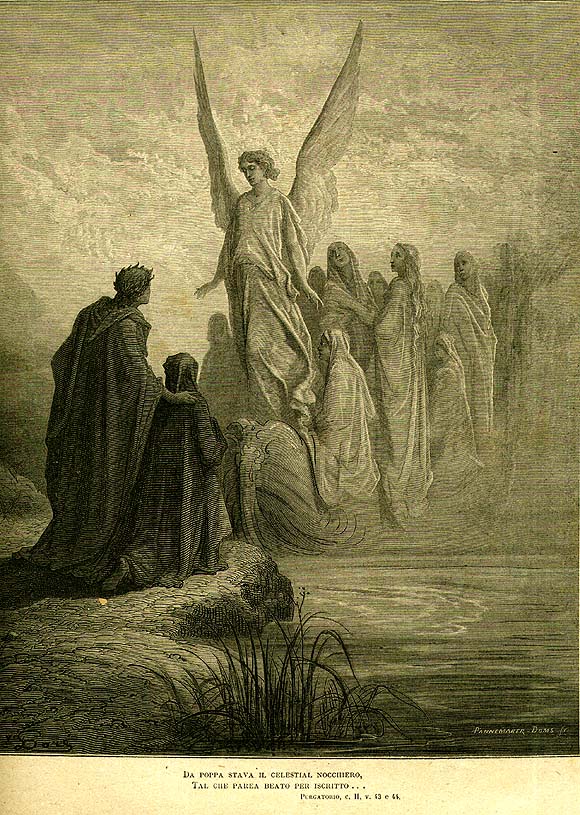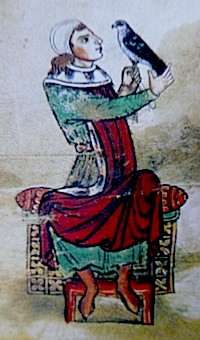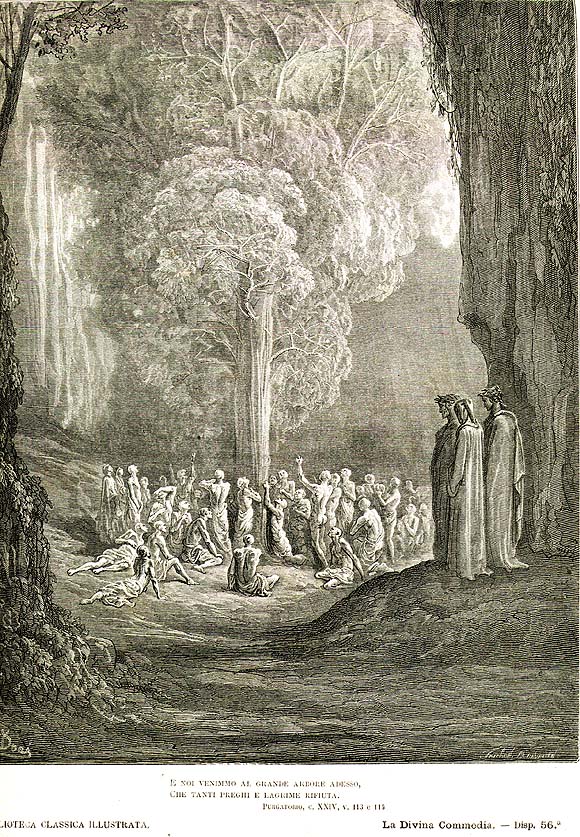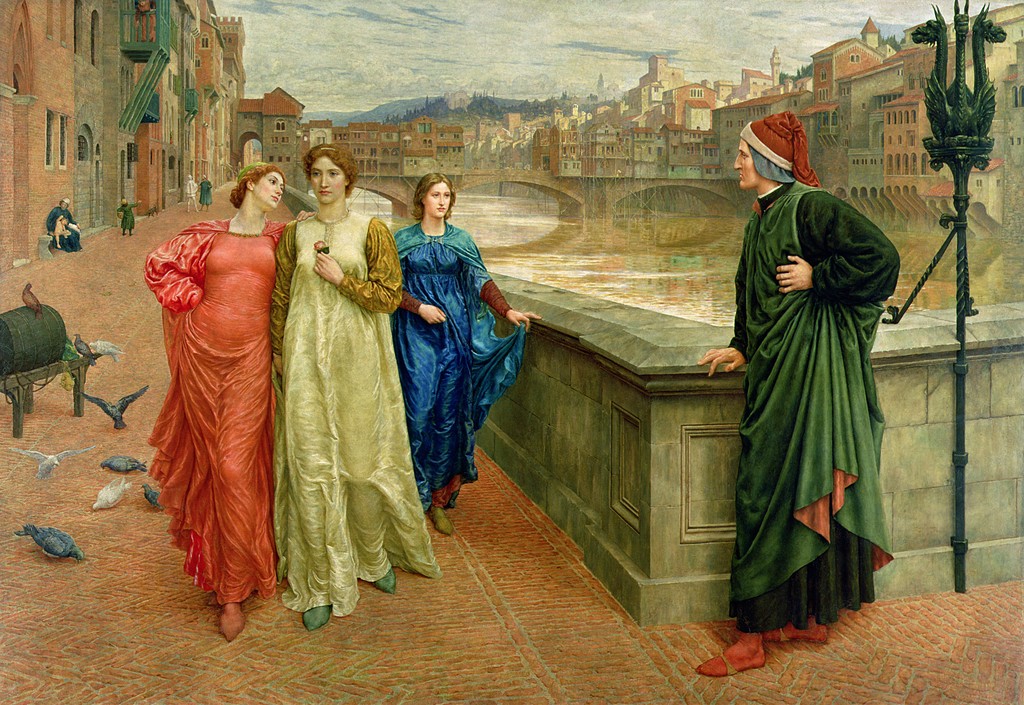|
Purgatorio
''Purgatorio'' (; Italian for "Purgatory") is the second part of Dante's ''Divine Comedy'', following the ''Inferno (Dante), Inferno'' and preceding the ''Paradiso (Dante), Paradiso''; it was written in the early 14th century. It is an allegory, allegorical telling of the climb of Dante up the Mount of Purgatory, guided by the Ancient Rome, Roman poet Virgil—except for the last four cantos, at which point Beatrice Portinari, Beatrice takes over as Dante's guide. Allegorically, ''Purgatorio'' represents the penitent Christian life.Dorothy L. Sayers, ''Purgatory'', notes on Canto VII. In describing the climb Dante discusses the nature of sin, examples of vice and virtue, as well as moral issues in politics and in the Church. The poem posits the theory that all sins arise from love—either perverted love directed towards others' harm, or deficient love, or the disordered or excessive love of good things. Overview of Purgatory Dante portrays Purgatory as an island-mountain ... [...More Info...] [...Related Items...] OR: [Wikipedia] [Google] [Baidu] |
Divine Comedy
The ''Divine Comedy'' (, ) is an Italian narrative poetry, narrative poem by Dante Alighieri, begun and completed around 1321, shortly before the author's death. It is widely considered the pre-eminent work in Italian literature and one of the greatest works of Western literature. The poem's imaginative vision of the afterlife is representative of the medieval philosophy, medieval worldview as it existed in the Western Christianity, Western Church by the 14th century. It helped establish the Tuscan dialect, Tuscan language, in which it is written, as the standardized Italian language. It is divided into three parts: ''Inferno (Dante), Inferno'', ''Purgatorio'', and ''Paradiso (Dante), Paradiso''. The poem explores the condition of the soul following death and portrays a vision of divine justice, in which individuals receive appropriate punishment or reward based on their actions.Vallone, Aldo. "Commedia" (trans. Robin Treasure). In: Lansing (ed.), ''The Dante Encyclopedia'', ... [...More Info...] [...Related Items...] OR: [Wikipedia] [Google] [Baidu] |
Statius
Publius Papinius Statius (Greek language, Greek: Πόπλιος Παπίνιος Στάτιος; , ; ) was a Latin poetry, Latin poet of the 1st century CE. His surviving poetry includes an epic in twelve books, the ''Thebaid (Latin poem), Thebaid''; a collection of occasional poetry, the ''Silvae''; and an unfinished epic, the ''Achilleid''. He is also known for his appearance as a guide in the ''Purgatorio, Purgatory'' section of Dante Alighieri, Dante's epic poem, the ''Divine Comedy''. Life Family background The poet's father (whose name is unknown) was a native of Velia but later moved to Naples and spent time in Rome where he taught with marked success. From boyhood to adulthood, Statius's father proved himself a champion in the poetic contests at Naples in the Augustalia and in the Nemean, Pythian Games, Pythian, and Isthmian Games, Isthmian games, which served as important events to display poetic skill during the early empire. Statius declares in his lament for his fath ... [...More Info...] [...Related Items...] OR: [Wikipedia] [Google] [Baidu] |
Nella Donati
Nella Donati (possibly also known as Giovanna or Giovannella) was a medieval noblewoman from Florence, Italy. She is primarily known because of Dante Alighieri's treatment of her relationship to her husband, Forese Donati, in the ''Divine Comedy'' and in a series of poems Dante exchanged with Forese. Biography Nella is associated with the Frescobaldi family. She was married to Forese Donati and they had one daughter named Ghita. In 1296, Forese died in Florence, and Nella became a widow. She has been described to be young at Forese's death. She is not known to have ever remarried.Diaz, S. E. (2011). ''Dietro a lo Sposo, SÍ La Sposa Piace: Marriage in Dante's 'Commedia (Doctoral dissertation, New York University, 2011). Ann Arbor, Michigan: ProQuest LLC. Nella is also associated with the Guelphs and Ghibellines, Ghibellines, according to Dante's writings.Díaz, S. E. (2014). Contested Virilities: Constructing masculinity in Dante's Tenzone with Forese. ''Italian Culture,'' ''32' ... [...More Info...] [...Related Items...] OR: [Wikipedia] [Google] [Baidu] |
Dante
Dante Alighieri (; most likely baptized Durante di Alighiero degli Alighieri; – September 14, 1321), widely known mononymously as Dante, was an Italian Italian poetry, poet, writer, and philosopher. His ''Divine Comedy'', originally called (modern Italian: ) and later christened by Giovanni Boccaccio, is widely considered one of the most important poems of the Middle Ages and the greatest literary work in the Italian language. Dante chose to write in the vernacular, specifically, his own Tuscan dialect, at a time when much literature was still written in Latin, which was accessible only to educated readers, and many of his fellow Italian poets wrote in French or Provençal dialect, Provençal. His ' (''On Eloquence in the Vernacular'') was one of the first scholarly defenses of the vernacular. His use of the Florentine dialect for works such as ''La Vita Nuova, The New Life'' (1295) and ''Divine Comedy'' helped establish the modern-day standardized Italian language. His wo ... [...More Info...] [...Related Items...] OR: [Wikipedia] [Google] [Baidu] |
Inferno (Dante)
''Inferno'' (; Italian for 'Hell') is the first part of Italian writer Dante Alighieri's 14th-century narrative poem ''The Divine Comedy'', followed by and . The ''Inferno'' describes the journey of a fictionalised version of Dante himself through Christian views on Hell, Hell, guided by the Ancient Rome, ancient Roman poet Virgil. In the poem, Hell is depicted as nine concentric circles of torment located within the Earth; it is the "realm[...] of those who have rejected spiritual values by yielding to bestial appetites or violence, or by perverting their human intellect to fraud or malice against their fellowmen". As an allegory, the ''Divine Comedy'' represents the journey of the soul toward God, with the ''Inferno'' describing the recognition and rejection of sin. Prelude to Hell Canto I The poem begins on the night of Maundy Thursday on March 24 (or April 7), 1300, shortly before the dawn of Good Friday. The narrator, Dante himself, is 35 years old, and thus "midway i ... [...More Info...] [...Related Items...] OR: [Wikipedia] [Google] [Baidu] |
Dante Alighieri
Dante Alighieri (; most likely baptized Durante di Alighiero degli Alighieri; – September 14, 1321), widely known mononymously as Dante, was an Italian Italian poetry, poet, writer, and philosopher. His ''Divine Comedy'', originally called (modern Italian: ) and later christened by Giovanni Boccaccio, is widely considered one of the most important poems of the Middle Ages and the greatest literary work in the Italian language. Dante chose to write in the vernacular, specifically, his own Tuscan dialect, at a time when much literature was still written in Latin, which was accessible only to educated readers, and many of his fellow Italian poets wrote in French or Provençal dialect, Provençal. His ' (''On Eloquence in the Vernacular'') was one of the first scholarly defenses of the vernacular. His use of the Florentine dialect for works such as ''La Vita Nuova, The New Life'' (1295) and ''Divine Comedy'' helped establish the modern-day standardized Italian language. His wo ... [...More Info...] [...Related Items...] OR: [Wikipedia] [Google] [Baidu] |
Manfred, King Of Sicily
Manfred (; 123226 February 1266) was the last King of Sicily from the Hohenstaufen dynasty, reigning from 1258 until his death. The natural son of the Holy Roman Emperor Frederick II, Manfred became regent over the Kingdom of Sicily on behalf of his nephew Conradin in 1254. As regent he subdued rebellions in the kingdom, until in 1258 he usurped Conradin's rule. After an initial attempt to appease Pope Innocent IV, he took up the ongoing conflict between the Hohenstaufens and the papacy through combat and political alliances. He defeated the papal army at Foggia on 2 December 1254. Excommunicated by three successive popes, Manfred was the target of a Crusade (1255–66) called first by Pope Alexander IV and then by Urban IV. Nothing came of Alexander's call, but Urban enlisted the aid of Charles of Anjou in overthrowing Manfred. Manfred was killed during his defeat by Charles at the Battle of Benevento, and Charles assumed kingship of Sicily. Early life Manfred ... [...More Info...] [...Related Items...] OR: [Wikipedia] [Google] [Baidu] |
Paradiso (Dante)
''Paradiso'' (; Italian for "Paradise" or "Heaven (Christianity), Heaven") is the third and final part of Dante's ''Divine Comedy'', following the ''Inferno (Dante), Inferno'' and the ''Purgatorio''. It is an allegory telling of Dante's journey through Heaven, guided by Beatrice Portinari, Beatrice, who symbolises theology. In the poem, Paradise is depicted as a series of concentric spheres surrounding the Earth, consisting of the Moon, Mercury (planet), Mercury, Venus, the Sun, Mars, Jupiter, Saturn, the Fixed stars, Fixed Stars, the Primum Mobile and finally, the Empyrean. It was written in the early 14th century. Allegorically, the poem represents the soul's ascent to God. Introduction The ''Paradiso'' begins at the top of Purgatorio, Mount Purgatory, called the Purgatorio#The Earthly Paradise, Earthly Paradise (i.e. the Garden of Eden), at noon on Wednesday, March 30 (or April 13), 1300, following Easter Sunday. Dante's journey through Paradise takes approximately twenty-f ... [...More Info...] [...Related Items...] OR: [Wikipedia] [Google] [Baidu] |
Purgatory
In Christianity, Purgatory (, borrowed into English language, English via Anglo-Norman language, Anglo-Norman and Old French) is a passing Intermediate state (Christianity), intermediate state after physical death for purifying or purging a soul. A common analogy is dross being removed from gold in a furnace. In Magisterium, Catholic doctrine, purgatory refers to the final cleansing of those who died in the State of Grace, and leaves in them only "the holiness necessary to enter the joy of heaven"; it is entirely different from the punishment of Damnation, the damned and is not related to the forgiveness of sins for salvation. A forgiven person can be freed from his "unhealthy attachment to creatures" by Indulgence#Catholic teaching, fervent charity in this world, and otherwise by the non-vindictive "temporal (i.e. non-eternal) punishment" of purgatory. In late medieval times, metaphors of time, place and fire were frequently adopted. Catherine of Genoa (fl. 1500) re-framed the ... [...More Info...] [...Related Items...] OR: [Wikipedia] [Google] [Baidu] |
Purgatory Plan
In Christianity, Purgatory (, borrowed into English via Anglo-Norman and Old French) is a passing Intermediate state (Christianity)">intermediate state after physical death for purifying or purging a soul. A common analogy is dross being removed from gold in a furnace. In Magisterium, Catholic doctrine, purgatory refers to the final cleansing of those who died in the State of Grace, and leaves in them only "the holiness necessary to enter the joy of heaven"; it is entirely different from the punishment of the damned and is not related to the forgiveness of sins for salvation. A forgiven person can be freed from his "unhealthy attachment to creatures" by fervent charity in this world, and otherwise by the non-vindictive "temporal (i.e. non-eternal) punishment" of purgatory. In late medieval times, metaphors of time, place and fire were frequently adopted. Catherine of Genoa (fl. 1500) re-framed the idea as ultimately joyful. It has been portrayed in art as an unpleasant (volu ... [...More Info...] [...Related Items...] OR: [Wikipedia] [Google] [Baidu] |
Beatrice Portinari
Beatrice "Bice" di Folco Portinari (; 1265 – 8 or 19 June 1290) was an Italian woman who has been commonly identified as the principal inspiration for Dante Alighieri's '' Vita Nuova'', and is also identified with the Beatrice who acts as his guide in the last book of his narrative poem the ''Divine Comedy'' (''La Divina Commedia''), '' Paradiso'', and during the conclusion of the preceding '' Purgatorio''. In the ''Comedy'', Beatrice symbolises divine grace and theology. Biography Beatrice was the daughter of the banker Folco Portinari and was married to another banker, Simone dei Bardi. Dante claims to have met a "Beatrice" only twice, on occasions separated by nine years, but was so affected by the meetings that he carried his love for her throughout his life. The tradition that identifies Bice di Folco Portinari as the Beatrice loved by Dante is now widely, though not unanimously, accepted by scholars. Boccaccio, in his commentary on the ''Divine Comedy'', was the f ... [...More Info...] [...Related Items...] OR: [Wikipedia] [Google] [Baidu] |









